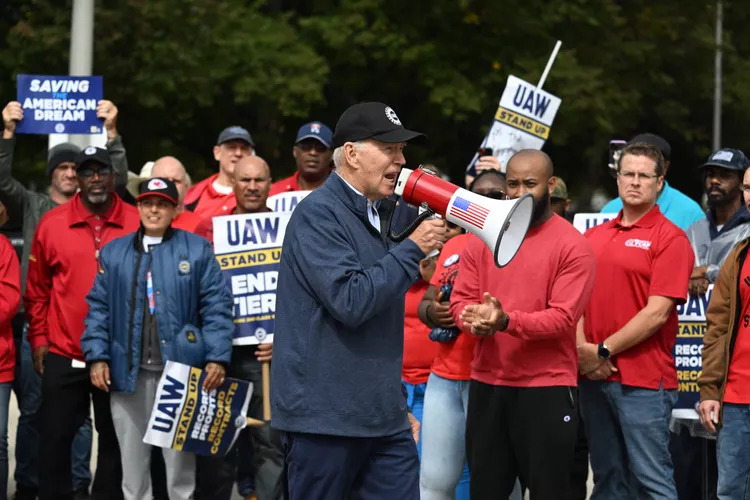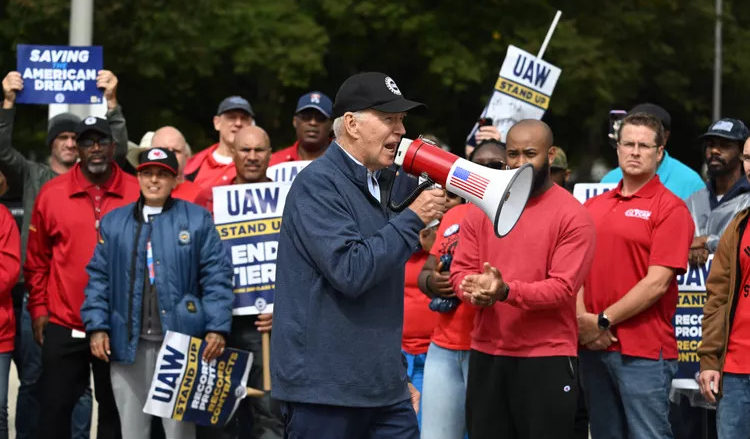
I would like to offer a very big caveat before this story: these strikes are ongoing situations that update almost daily. All the information in this story is up-to-date as of October 12th, 2023. By the time you read this, the information may not be accurate.
On September 14th, at 11:59 PM, 13,000 workers at three car manufacturing plants put down their tools and walked off the assembly line; they were on strike.
Days earlier, talks had broken down between the UAW and the “Big Three” US car manufacturers, Ford, General Motors, and Stelantis.
The UAW strike, which has now ballooned to over 27,000 workers, is just one of the numerous strikes that have occurred in 2023. Other strikes include the writer’s strike and the actors’ strike (SAG-AFTRA and WGA). I’d like to acknowledge that there are many other strikes around the country, including a threatened UPS strike, but for the sake of my sanity (and the word count), we’ll only be focusing on those three.
WGA vs. “The Big Three”
The Players:
• UAW – United Auto Workers represents workers in car manufacturing, amongst other industries
• The “Big Three” – Ford, GM, and Stelantis
The Demands:
• 40% (now 36%) raise in wages over four years
• Reinstatement of regular cost-of-living adjustments
• End to the pay tier system, a system that leaves newer workers on a lower pay scale
• Reinstatement of pensions
• Cover all health-care costs for retirees
• 32-hour work week at 40-hour pay
While some progress has been made with the manufacturers agreeing to some of the union’s demands, the two sides are far from reaching an agreement. Shawn Fain, president of the UAW, is criticizing the Big Three for their greed, while the CEOs claim that the UAW is asking too much. On September 26, Joe Biden joined the UAW picket line, making him the first sitting president to do so.
The Writers’ Strike
The Players:
• WGA West & East – Writers Guild of America represents writers in film, television, radio, and online media
• AMPTP – Alliance of Motion Picture and Television Producers represents television and film production companies
The Demands:
• Higher royalties, especially among streaming services
• Protections to writing rooms
• Guaranteed minimum wage for writers for streaming television
• Protections against AI
On September 27th, after 148 days on the picket line, the negotiating committee announced that they had come to a tentative agreement with the studios and had voted to end the strike. On October 9, the WGA membership voted to ratify the contract. In a letter to the membership announcing the contract, the committee stated, “We can say, with great pride, that this deal is exceptional — with meaningful gains and protections for writers in every sector of the membership.”
The Actors Strike
The Players:
• SAG-AFTRA – Screen Actors Guild-American Federation of Television and Radio Artists
• AMPTP
The Demands:
• Better residuals for streaming
• Protection from AI use of actors’ likeness and writers’ works
• Ratification of a labor contract
Like the WGA strike, one of the main sticking points for the strike is residuals for streaming services (how much an actor, writer is paid every time their work is bought or streamed after initial production). For years, actors and others have been seeing staggering differences in how much money they made from residuals as opposed to payment upon completion of the series or movie. Another concern is the use of AI; studios want the right to “scan in” an actor, make an AI model, and use them in perpetuity as background characters without compensating them. While negotiations had resumed on October 2nd, by October 11th, it was announced that the negotiations had been suspended.
I will leave you, dear readers, with one question for you to ponder: as there seems to be no end in sight for corporate greed, when must the government step in to protect the workers?

